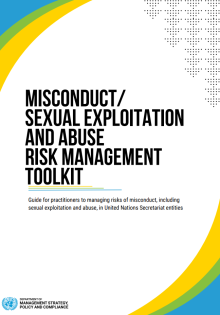Planning and risk management on conduct and discipline issues is an important part of the United Nations’ approach to address misconduct in each area of the three-pronged strategy: i) prevention of misconduct, ii) enforcement of the UN standards of conduct and iii) remedial action, including support to victims and children born from sexual exploitation and abuse.
Missions are encouraged to integrate risk management in all mission operations at the outset in mission planning and resource allocation at all levels of the accountability chain in mandate delivery. This shared understanding must be reflected in structures and accountability frameworks.
Missions are also expected to develop risk management plans, which should look at the level of risk and specific risk factors linked to possible misconduct by their personnel, with particular emphasis on sexual exploitation and abuse for each prong of the three-pronged strategy.
As part of related risk management activities, as appropriate, missions conduct risk assessment visits and patrols, identify and assess risks and their sources, undertake mitigating actions and conduct follow-up visits to ensure that identified risks are adequately addressed and mitigated. Missions are guided by the DMSPC SEA Risk Management Toolkit and the Misconduct Risk Management Tools.
Missions report to the Conduct and Discipline Service on a quarterly basis on their risk assessment and mitigation activities. Missions have also been requested to develop mission-specific plans of action, based on the realities on the ground in each mission.
In 2024, the Conduct and Discipline Service, in the Department of Management Strategy, Policy and Compliance, revised the Misconduct/SEA Risk Management Toolkit, combining what had previously been two separate tools into one and fine-tuning the tools based on lessons learned. In this revision, the Toolkit updates are intended to assist practitioners across the global UN Secretariat to manage risks relating to conduct and discipline issues, including sexual exploitation and abuse. This guidance and its underlying methodology and tools are essential to ensure that the UN Secretariat is able to achieve its mandate and goals. The Toolkit revisions include information on the victim-centered approach, sexual harassment, fraud, the use of data analytics and how to conduct risk management with a regional/field-based approach, which will help to ensure a consistent and integrated approach to misconduct/SEA risk management from Headquarters to field operations.
Click on the image below to access the pdf version of the Toolkit.

